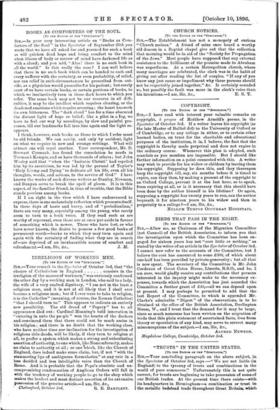BOOKS AS COMFORTERS OF THE SOUL
[TO THY EDITOR OP THY " SPRCTATOR.']
Sin,—In your very interesting article on "Books as Com- forters of the Soul" in the Spectator of September 26th you wrote that we have all asked for and yearned for such a book as will quicken dead hope and bring comfort to the mind when illness of body or sorrow of mind have darkened life as with a cloud; and you add, " Alas ! there is no such book in all the world." Is this really the case ? I can well believe that there is no such book which can be handed to each and every sufferer with the certainty, or even probability, of relief, nor can relief in such circumstances be prescribed from out- side, as a physician would prescribe for his patient; but surely most of us have certain books, or certain portions of books, to which we instinctively turn in those dark hours to which you refer. The same book may not be our resource in all diffi- culties, it may be the intellect which requires clearing, or the deadened emotions which require arousing ; the heart knoweth its own bitterness. The "dark cloud" has for a time obscured the distant light of hope or belief; like a pilot in a Tog, we have to feel our way by soundings, by slow and painful pro- cesses, till our landmarks fall into line again and the light re- appears.
I think, however, such books as those to which I refer must be old friends. We can rarely, and only by accident, light on what we require in new and strange writings. What will attract one will repel another. Your correspondent, Mr. D. Stewart Cormack, has found the consolation he needs in Thomas h Kempis, and so have thousands of others ; but John Wesley said that "when the 'Imitatio Christi' had repelled him by its asceticism, he was led by the perusal of Taylor's Holy Living and Dying' to dedicate all his life, even all his thoughts, words, and actions, to the service of God." I have known the works of such diverse writers as Stanley, Newman, and Bunyan serve to break the spell of gloom. It is in this aspect, of the familiar friend, in time of trouble, that the Bible stands peerless among books.
If I am right in the view which I have endeavoured to express, there is one melancholy reflection which presents itself. In these days of haste and hurry, and of " periodicalism," there are very many, especially among the young, who rarely seem to turn to a book twice. If they read such as are worthy of reperusal, even these are at once put aside in favour of something which is newer. Those who have lost, or who have never known, the desire to possess a few good books of permanent worth—books to which they may turn again and again with the certainty of finding what they are in search of—are deprived of an inexhaustible source of comfort and


















































 Previous page
Previous page